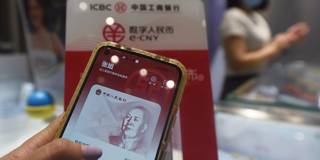For two decades, Sino-Western integration powered the global economy and seemed to foster greater geopolitical stability. But now that China has moved well beyond being a mere exporter of low-cost labor-intensive garments and electronics, both the economics and the politics of its rise have fundamentally changed.
- Martin Chorzempa, The Cashless Revolution: China’s Reinvention of Money and the End of America’s Domination of Finance and Technology, PublicAffairs, 2022.
Edwin L.-C. Lai, One Currency, Two Markets: China’s Attempt to Internationalize the Renminbi, Cambridge University Press, 2021.
Andrew Small, The Rupture: China and the Global Race for the Future, Hurst Publishers, 2022.
Paul Tucker, Global Discord: Values and Power in a Fractured World Order, Princeton University Press, 2022.
LONDON – China’s rise has been the defining story of the past three decades. No analysis of international economics or politics can ignore it. But the conversation has shifted over time. Before 2017, it was widely believed that China could become a “responsible stakeholder” in the international institutions that emerged after World War II and survived the Cold War. But now, many worry that China is “an illiberal state seeking leadership in a liberal world order,” as former Bank of England Deputy Governor Paul Tucker puts it in Global Discord. The question, then, is how liberal democracies with market economies should deal with such a state when it becomes a systematically important power.

Edwin L.-C. Lai, One Currency, Two Markets: China’s Attempt to Internationalize the Renminbi, Cambridge University Press, 2021.
Andrew Small, The Rupture: China and the Global Race for the Future, Hurst Publishers, 2022.
Paul Tucker, Global Discord: Values and Power in a Fractured World Order, Princeton University Press, 2022.
LONDON – China’s rise has been the defining story of the past three decades. No analysis of international economics or politics can ignore it. But the conversation has shifted over time. Before 2017, it was widely believed that China could become a “responsible stakeholder” in the international institutions that emerged after World War II and survived the Cold War. But now, many worry that China is “an illiberal state seeking leadership in a liberal world order,” as former Bank of England Deputy Governor Paul Tucker puts it in Global Discord. The question, then, is how liberal democracies with market economies should deal with such a state when it becomes a systematically important power.